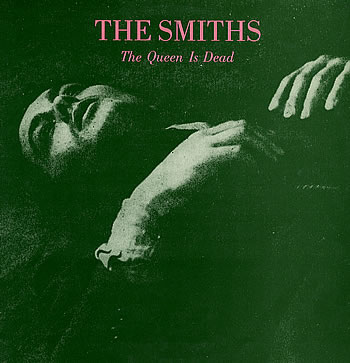
The Front Cover
If you have read the general introduction you already know I regard this album as The Smith’s crowning achievement. In a certain sense, it does what was done in the previous albums. But the difference is that what was previously done either good or very good now is done in an excellent fashion. With the sole exception of “Vicar In A Tutu” (a rockabilly number that is best left alone) and the acceptable “Never Had No One Ever”, all the songs hit hard. Generally speaking, they make a solid point out of solid disappointment: “I Know It’s Over” and “There Is A Light That Never Goes Out” deal with the anxiety of a love that ends and takes life away with it, and a love that ends without ever having started respectively. For its part, the bouncy “Frankly, Mr. Shankly” takes the form of a resignation letter from a disgruntled employer to his boss, in which (as much as he tries to refrain from doings so) he must finally “speak frankly, Mr. Shankly” and call a spade a spade.
A note as regards that song: it was about the head of their record company, Geoff Travis. The fact that he was also the recipient of the more direct and spiteful “You Just Haven’t Earned It Yet Baby” makes it all too clear Morrissey’s stance on authoritative figures within his life and career.
Speaking of authority, his political viewpoints (which were somehow announced in the song “Nowhere Fast” from the previous album) now occupy a more marked space. The fact that the song after which the album is named is the one starting proceedings can not be ignored. As I likewise mentioned on the general introduction, it features one of the best ensemble performances from the whole band. And it also has the priceless lines “I know you and you can’t sing/That’s nothing, you should hear me play the piano”. Listen to the next album if you didn’t get the joke, and look at the credits for the song “Death Of A Disco Dancer”.
The first single was seemingly an odd choice: “The Boy With The Thorn In His Side”. The single release was a different mix – you can listen to it on “The World Won’t Listen” compilation, it has no “orchestrations” (IE, Marr adding strings using a keyboard). It failed to ignite that much interest, but such a move was typical of The Smiths – they always defied the status quo of music as a whole, and the fact that this album is tailed by the seemingly lacking “Some Girls Are Bigger Than Others” instead of the powerful “There Is A Light That Never Goes Out” just reminds us that The Smiths were never ones to pay any heed to conventions or the standard practices of music biz.
The second single was a different matter. You can not describe it using a lengthy definition, but it can be described in just one word: bestial. “Bigmouth Strikes Again” is one of the best compositions Morrissey and Marr would craft, and it spotlights the darker side of Morrissey psyche, a side which is actually present in every single person. He has the merit of discussing a somber matter (the role imminent and present violence plays in any relationship) in a somehow humorous fashion, but the humor (as it is often the case) actually helps the point be made more cogently.
The jangly “Cemetry Gates” is also a gem, and one which recounts Morrissey’s younger escapades. It ends up placing him in a bit of a paradoxical position, as Moz deals with literary appropriation and warns about its dangers when the lyrics themselves feature an extraordinarily lengthy portion from the movie “The Man Who Came To Dinner” (1942). “There is always someone with a big nose/who knows”, indeed!
I left the two most poignant songs for last, albeit they were already mentioned and somehow discussed above. “I Know Is Over” is the most sorrowful pronunciation of loss I have ever came across, and the actual structure (the opening line “Oh mother, I can feel the soil falling over my head” being repeated incessantly at the end) does nothing but underline the fact that memories are nothing but phantoms of the heart, and no matter how cherished or loathed they stand, they are dispelled by the impact of even a single grain of reality. On the other hand, “There Is A Light That Never Goes Out” was used to promote the “Singles” compilation two decades later, and it is a song that will have eternal relevance – where there is first love and its permanent disillusion, there is room for this song.
This is the first album I review here that I score so highly, and that was the reason I tried and provide you as much of an exhaustive overview as I could. It is unquestionably their finest moment as a band, and one of the defining albums of 80s music. If you are unsure whether The Smiths are for you or not, this is the record that will dispel all your doubts.
Rating: 9.5/10

Pingback: The Smiths – General Introduction | MusicKO
Pingback: Strangeways, Here We Come (The Smiths) – Album Review | MusicKO
Pingback: The World Won’t Listen (The Smiths) – Album Review | MusicKO